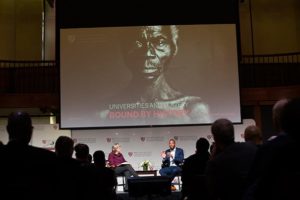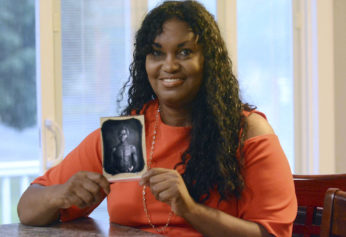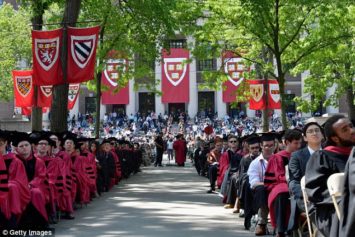
At Harvard University’s “Universities and Slavery: Bound By History” conference, writer Ta-Nehisi Coates argued that reparations were necessary to atone for a past linked to slavery. Photo by Stephanie Mitchell/Harvard Staff Photographer.
In an attempt to atone for its role in human bondage, Harvard University on Friday, March 3, hosted a conference addressing the institution’s historic, and oftentimes forgotten, ties to slavery, with some participants even advocating for monetary reparations.
The conference, titled “Universities and Slavery: Bound by History,” was the latest in a series of efforts taken by the Ivy League university to confront its dark history of enslavement, The Harvard Crimson reported. The day-long symposium drew hundreds of guests from all over, featuring historians and representatives from several universities and a keynote address by writer Ta-Nehisi Coates of The Atlantic.
University President Drew G. Faust delivered the opening remarks.
“Harvard was directly complicit in slavery from the college’s earliest days in the 17th century,” said Faust, who announced plans for the conference in March 2016. “This history and its legacy have shaped our institution in ways we have yet to fully understand. Today’s conference is intended to help us explore parts of the past that have remained all but invisible.”
Coates built upon the president’s remarks in his keynote address, describing slavery and the impacts of racial discrimination that arose from it as “systems of plunder that haunt us to this day.” As an outspoken advocate for reparations, the well-known journalist pushed the idea on conference attendees Friday, asserting that racial progress requires institutions like Harvard to pay its debts to those that it enslaved.
“I think every single one of these universities needs to make reparations,” Coates said, as the audience erupted in applause. “I don’t know how you get around that, I just don’t. I don’t know how you conduct research that shows that your very existence is rooted in a great crime, and just say ‘Well,’ shrug — and maybe, at best, say ‘I’m sorry’ — and you walk away.
“I think you need to use the language of ‘reparation,‘” he continued. “I think it’s very, very important to actually say that word, to acknowledge that something was done in these institutions.”
In the past few years, the Cambridge, Mass., university has taken a number of steps to acknowledge its connection to slavery. In March of last year, the institution bent to mounting pressure to remove the family seal of notorious slave owner Isaac Royall. The controversial seal represented the law school for nearly a century and was adopted in 1937 to honor Royall’s contribution to the university, according to Atlanta Black Star.
Months later, the prestigious university recognized four enslaved persons — Titus, Venus, Jubah and Bilhah — who lived and worked on university grounds by dedicating the official residence of Harvard’s presidents in their honor.
Harvard isn’t the only university that has come clean about the role of slavery in its establishment. Earlier this year, a history professor at Columbia University published a report detailing how the transatlantic slave trade helped finance the school in its humble beginnings, while Georgetown University extended legacy admissions privileges to the descendants of 272 enslaved workers who were sold to keep the institution financially afloat in 1838.
History professor Sven Beckert, who has investigated Harvard’s ties to slavery in the past, said the process of unearthing this bitter history started in 2007 with a self-led seminar on the history of slavery at the university. Over the years, Beckert said his students discovered stories of enslaved Blacks who worked on campus under two Harvard presidents and uncovered endowment investments tied to the slave economy. One student, who presented the findings as part of her senior thesis on Friday, revealed that Harvard had used the Caribbean plantation of a former slave-holding donor as a botanical research outpost until 1961.
“When the students began to uncover a different history, they and others who listened to them were surprised,” Beckert said. “Yet, in retrospect, it seems that the only thing that should surprise us was our surprise and that it took so long for us to allow ourselves to be surprised by that history.”
Unlike Coates, Faust has stopped short of supporting reparations. In an interview with The Harvard Crimson last fall, Faust said offering repayment or preferential treatment like Georgetown University has wouldn’t be appropriate for Harvard, since it didn’t directly own slaves.
“I am not aware of any slaves that were owned by Harvard itself, and slavery was much less of a presence and an economic force in New England than it was in Washington, D.C., and the South,” she said. “Mostly, slave records were kept as economic records, business records, and the records we have of slaves at Harvard are much scarcer and less complete.”
Coates disagreed at Friday’s conference, asserting that atonement must involve some sort of monetary repayment.
The institution’s faculty committee is expected to continue studying Harvard’s ties to slavery and plans to release a set of recommendations to the University in the coming months, according to the newspaper.


